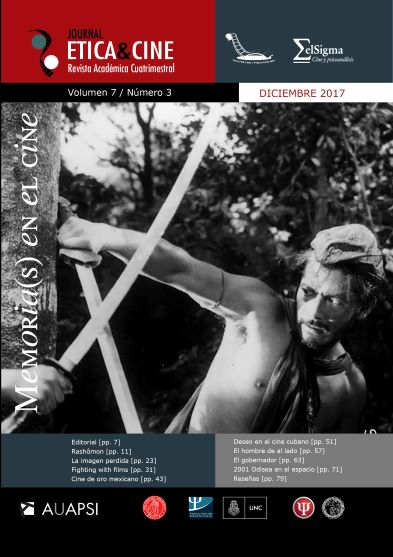The repression of the desire in Cuban cinema: the sexual antiheroes of Memories of Underdevelopment, Cecilia and Strawberry and Chocolate
DOI:
https://doi.org/10.31056/2250.5415.v7.n3.19624Keywords:
Cuban cinema, Sexuality, Cinema and ideologyAbstract
This article explores the “playboy” as a sexual antihero in three of the most representative films of Cuban cinema, Memorias del subdesarrollo (1968), Cecilia (1981), and Fresa y Chocolate (1994). The visual censorship of these antiheroes reflects the moral architecture of a political system that, at least during the 1960s, tried to “dictate” the intimate life of its citizens. Through a detailed analysis of the three films, it seeks to demonstrate that this repression of desire transcends the condemnation of a visual patriarchy, joining Hollywood cinema in the sanction of sexual appetite. The repressions of film protagonists Sergio, Leonardo and Diego represent a conservative and bourgeois morality, despite some legitimate intentions such as the irony over the male desire of the camera or the integration of the homosexuality in revolutionary Cuba.Downloads
References
Bejel, E. (1994). Fresa y chocolate o la salida de la guardia. Casa de las Américas. 196, 11-22.
Bejel, E. (1997). Strawberry and Chocolate, Coming Out of the Cuban Closet. South Atlantic Quarterly. 46 (1), 66-84
Benamou, C. (1994). Cuban Cinema: On the Threshold of Gender. Journal of Women Studies. 15 (1), 51-75.
Berthier, N. (2004). Cine y revolución: Memorias del subdesarrollo de Tomás Gutiérrez Alea. Anuario del Archivo Histórico Insular de Fuerteventura. 5, 564-575.
Butler, J. (1990). Gender Trouble. Feminism and the subversión of identity. New York: Routledge.
Caballero, R. y J. del Río. (1995). No hay cine adulto sin herejía sistemática. Temas. 3, 102-115.
Chanan, M. (2004). Cuban Cinema. Minneapolis: University of Minessota Press.
De la Campa, R. (1986). Memorias del subdesarrollo: Novela/Texto/Discurso. Hispamérica. 44, 3-18.
Foucault, M. (1978). History of Sexuality. Vol 1: An Introduction. New York: Vintage Books.
Jaimes, H. (2006). Memorias del Desarrollo: El placer de las ruinas (entrevista a Desnoes). Contracorriente. 4 (1): 110-119.
Marx, K. & F. Engels. (1906). Manifesto of the Communist Party (1848). Chicago: Charles H. Kerr & Company.
Mulvey, L. (1989). Visual and other pleasures. Bloomington: Indiana University Press.
Padrón, F. (2007). El gay y otros sujetos semejantes en el audiovisual cubano. Temas .52: 144-154.
Pinker, S. (2007). The evolutionary social psychology of off-record indirect speech acts. Intercultural Pragmatics. 4 (4): 437–461.
Redruello, L. (2004). “La mujer en el espacio fílmico de Tomás Gutiérrez Alea. La Palabra y el Hombre. 132: 47-61
Rosell, S. (2000). Revisión de mitos en torno a Cecilia y Francisco: de la novela del s. XIX al cine. Hispania. 83 (1): 11-18.
Santi, E. (1998). Fresa y Chocolate: The Rhetoric of Cuban Reconciliation. MLN Hispanic Issue. 113 (2): 407-425.
Smith, P. J. (1996). Vision machines: cinema, literature, and sexuality in Spain and Cuba, 1983-93. London: Verso.
Downloads
Published
How to Cite
Issue
Section
License
Los autores que publiquen en Ética y Cine Journal aceptan las siguientes condiciones:
Los autores/as conservan los derechos de autor © y permiten la publicación a Ética y Cine Journal, bajo licencia CC BY-SA / Reconocimiento - Reconocimiento-CompartirIgual 4.0 Internacional. La adopción de esta licencia permite copiar, redistribuir, comunicar públicamente la obra, reconociendo los créditos de la misma, y construir sobre el material publicado, debiendo otorgar el crédito apropiado a través de un enlace a la licencia e indicando si se realizaron cambios.

Este obra está bajo una licencia de Creative Commons Reconocimiento-CompartirIgual 4.0 Internacional.




